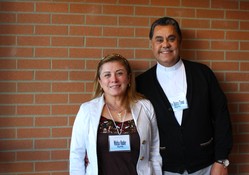Eleven international peacemakers from around the world visited congregations, presbyteries and colleges of the Presbyterian Church (U.S.A.) from Sept. 27-Oct. 21.
They shared their stories about church-based ministries in their countries that seek peace justice and pursue peace in the name of Jesus Christ. This year’s international peacemakers come from Bolivia, Colombia, Iran, Iraq, Israel/Palestine, Jamaica, Madagascar, Niger, Northern Ireland, South Sudan and Syria.
The International Peacemaker program is sponsored by the Presbyterian Peacemaking Program.
The Rev. Boutros Zaour has been serving in Syria as pastor of the Evangelical Church of Damascus since 1997. He is a graduate of the Near East School of Theology in Beirut, Lebanon and is active on a number of councils in the Evangelical Synod of Syria and Lebanon, the PC(USA)’s partner church in the region.
Zaour visited the presbyteries of East Tennessee, Long Island, Mackinac and Santa Fe.
What is the situation in your country that you addressed?
I’m here as a peacemaker, not a politician. I have to say the truth about how we’re living now. It’s a very dark situation. As a peacemaker, I don’t think about peace because already we were living in peace. We never imagined we would have this situation. We never imagined this peaceful country and stable country could be unstable.
What motivates me also is how we’re living in a very needy society which needs some encouragement—mostly refugees from Damascus. Give them peace and hope.
How are the faith communities addressing this situation?
We’re trying to do this through the youth group. (Young people) are depressed and need someone to stay with them and give them hope that one day it will be better than before.
During the past two and a half years, most students got behind in their studies. They have to finish their studies to have jobs and a future, so they’re sad and depressed. Schools and universities have been damaged and school records have been lost.
We can live without food for many days and without water, but we cannot live without hope. No words will describe what we’re living.
The church is doing normal activities like worship, meetings and Sunday school, but the social and health committees are helping refugees by providing food and clothing and medicine. We worship with them and instruct them and encourage them.
What lessons from your situation are you trying to communicate to U.S. Presbyterians?
Pay more attention to the new generation. If you don’t take care of them spiritually, there is no future for them here. It’s better to start in the home than go to Africa if your home is not well-equipped spiritually.
What is the primary message you want to communicate to U.S. Presbyterians?
You’re strong here. You have a strong influence on your government. You can do something for our country. You can tell your government to keep its hands off Syria. We need to solve our own problems.

